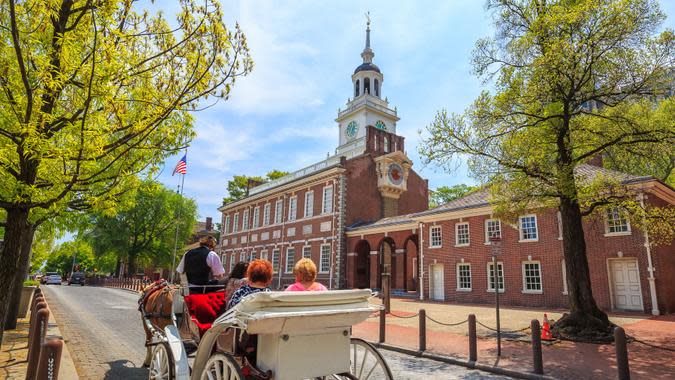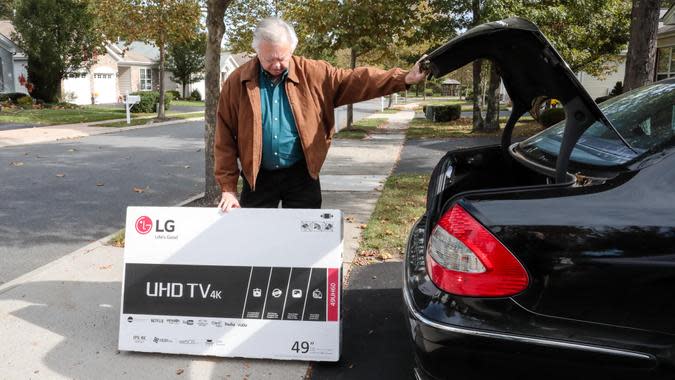31 Surprising Facts About Retiring You Probably Didn’t Know

It's never too early to start thinking about how you want to spend your time -- and your money -- in retirement. No matter if you're hoping to retire as early as possible or plan to work until you can't, having a plan for how you want to spend your senior years turns dreams into reality.
Read More: Most Tax-Friendly States To Retire
Keep reading to find out the interesting and lesser-known retirement facts that will help you prepare.
Discover: Best Cities To Retire on a Budget of $1,500 a Month

1. Social Security Won't Cover All Your Expenses
Social Security isn't designed to be your only source of income during your golden years. According to the Social Security Administration, Social Security benefits are only intended to replace about 40% of your income from when you were working.
See: The Cost To Retire in America's Sunniest Cities

2. Older People Value Older Workers
Baby boomers think that workers ages 50 and older contribute more to the workplace than younger generations in a range of categories. For example, 51% of baby boomers think that older workers are more adept at solving problems, while only 22% of millennials think the same of boomers.
Work: Chick-fil-A and 23 More Companies With Surprisingly Great 401(k) Plans

3. Seniors Like Movies
People ages 50 and older make up almost one-third of all trips to the movies in the United States, seeing an average of 6.8 movies per year, but 70% of the time they go before 7 p.m. And, as people get older, they tend to see more: According to AARP, people ages 65 and older see 7.3 movies per year.

4. Pennsylvania Has the Second-Highest Proportion of Seniors
Given its reputation, it's no surprise that Florida has the largest percentage of its population as senior citizens at 17.3%, according to the most recent 2010 census. However, the next two might surprise you: Pennsylvania at 15.4% and West Virginia at 16%.

5. Seniors Live Alone
According to the Institute on Aging, nearly one in three seniors who weren't in a nursing home lived alone, with older women almost twice as likely to live alone than men. And, seniors get more isolated as they get older: Nearly 1 in 2 senior women over age 75 live alone.
Check Out: What a Comfortable Retirement Costs in the US

6. Who Matters More Than What
When asked which was more important, the leisure activity they were doing or the people they were doing it with, over 60% of respondents in a Merrill Lynch study said who they were doing it with mattered more than the things they were doing in retirement.

7. Retirees Relax More
Older people relax more, said Brian Saranovitz, co-founder of Your Retirement Advisor and investment advisor representative with Cetera Advisors. According to a Merrill Lynch study, only 41% of people ages 25 to 34 reported often feeling relaxed, and over 70% of people ages 65 and older reported often feeling relaxed.

8. Social Security Might Not Be Taxed By Your State
The IRS taxes up to 85% of your Social Security benefits, but depending on where you live, you might not have to pay state income taxes on your Social Security benefits. Only 13 states impose state income taxes on all or a portion of your benefits: Colorado, Connecticut, Kansas, Minnesota, Missouri, Montana, Nebraska, New Mexico, North Dakota, Rhode Island, Utah, Vermont and West Virginia.

9. Retirees Love To Travel
According to a survey by AARP, 99% of baby boomers traveled for fun, with the average senior taking five trips. When you count people ages 50 and older, the group spends about $125 billion on leisure travel each year.

10. Most Haven't Budgeted For Trips
About two-thirds of retirees ages 50 and older said they hadn't budgeted for travel in retirement, according to a Merrill Lynch study. Plus, over 50% said they had done hardly any leisure travel planning for the year ahead, and only 10% said they had done a lot.

11. Retirees Think They Have Plenty of Life Left
Just because someone has retired doesn't mean they expect to die in the near future. When the Transamerica Center for Retirement Studies surveyed baby boomers, 21% expected to live between 90 and 99 and another 10% expected to live to age 100 years old or older.

12. The IRS Offers Free Tax Help for Seniors
You probably won't look forward to doing your taxes in retirement any more than when you were younger, but the IRS has a special program, Tax Counseling for the Elderly, to provide free tax assistance to people ages 60 and older. You can get answers to questions, and some programs can even prepare your return for you.

13. TV Watching Becomes More Common
People ages 65 and older watch the most TV per day of any age group, according to the Bureau of Labor Statistics' American Time Use Survey released in 2017. According to the survey, seniors spend about four hours per day watching TV, compared to two hours for people ages 15 to 44.

14. Seniors Think Green
Almost 70% of people ages 50 or older recycle regularly, and over 70% use energy-efficient bulbs. But, only about one-third buy locally grown food and about 2% own or lease hybrid vehicles.

15. Retirees Could Still Be Paying Off Student Loans
If you think you won't have to worry about student loans in retirement, you could be wrong. According to the Consumer Finance Protection Bureau, the number of older student loan borrowers -- defined as ages 60 and older -- increased by at least 20% in every state between 2012 and 2017. In more than half of states, the number increased by 46% or more during the same time period.

16. Retirees Like Their Rewards Program
Over 80% of boomers belong to at least one airline loyalty program and over 70% belong to a hotel loyalty program, according to AARP. That's about 10 percentage points higher than millennials in both categories.
Related: 35 Retirement Planning Mistakes That Waste Your Money

17. Retirees Use Airbnb
Over 1 million users of Airbnb are over age 60 around the world, reported a Merrill Lynch study, including 10% of hosts. These hosts make an average of $6,000 per year. Retirees can generate income by renting out a spare bedroom or guesthouse.

18. Retirees Are More Likely to Directly Own Stocks
According to the 2016 Survey of Consumer Finances (the most recent survey available), the Federal Reserve found that people ages 75 and older were the most likely group to directly own stocks. People ages 65 to 74 were the third most likely to own at 15.2%, just below the 55 to 64 age group at 15.5% directly owning stocks.

19. Retirement Doesn't Mean You Stop Working
Over half - 54% - of baby boomers plan to keep working after they retire, according to the Transamerica Center for Retirement Studies. But, it's not all for financial reasons. Some baby boomers plan to keep working by choice so they can age well and stay busy.

20. Retirees Have Spending Money
Retirees are getting richer. According to the Fed's Survey of Consumer Finance, the average net worth for people ages 55 to 64 is over $187,000. For people ages 65 to 74, that figure increases to over $224,000, and for people ages 75 and older, their average net worth is almost $265,000.

21. Retirees Part With Their Businesses
Business ownership is at 17.3% for both the 45 to 54 age group and the 55 to 64 age group, the highest of any age group, according to the Survey of Consumer Finance. The percentage drops to 13.3% for people ages 65 to 74 and then falls even further to 8.5% for people ages 75 and older.

22. Cost of Living Matters Most to Retirees
The single biggest factor for baby boomers when picking where to live is the cost of living. According to the Transamerica Center for Retirement Studies, 80% of baby boomers said it was a very important factor. The second-most frequently selected very important factor was close proximity to family and friends.

23. Retirees Might Still Be Paying Mortgages
Over 35% of people ages 65 to 74 are still paying off mortgages, according to the Survey of Consumer Finance. Of respondents ages 75 and older, less than one in four is still paying off a mortgage.

24. Grandchildren Are the Favorites
When it comes to leisure experiences, retirees prefer spending time with grandchildren over children. A Merrill Lynch survey asked respondents whether leisure experiences with their children or grandchildren are more enjoyable, and 60% of respondents picked grandchildren.

25. Access To Continuing Education Isn't That Important
Retirees might think they'll spend time going back to school or taking classes, but it doesn't factor into decisions of where to live much for baby boomers. The Transamerica Center for Retirement Studies reports only 7% of baby boomers said that access to continuing education opportunities was a very important factor in deciding where to live.

26. Retirees Don't Automatically Consider Themselves 'Old'
When the Center for Retirement Studies asked baby boomers what age they considered someone "old," 17% said between 70 and 79, and another 15% said between 80 and 89. However, a much larger group, 52%, said it depends on the person.
See: How Much People Have Saved for Retirement in Every State

27. Retirees Aren't Giving Up Their Keys
Car ownership statistics don't decline much as people get older. Car ownership peaks at 89.1% for people ages 45 to 54, declines a bit to 86.1% for people ages 55 to 64, but then inched back up to 86.8% for people ages 65 to 74 before falling to 82.2% for people ages 75 and older. Retirees might not be driving their car as much - or at all - but they still own their cars.

28. Retirees Can Still Save With Roth IRAs
Just because you quit your day job doesn't mean all retirement plans are off-limits to you. As long as you have taxable compensation, including wages from a side job or self-employment income, you can contribute to a traditional IRA until the year you turn 70 1/2 years old.
There's no limit to how old you can be to contribute to a Roth IRA. There are limits to how much you can contribute, however.

29. Credit Card Debt Goes Down, Eventually
The percentage of people ages 65 to 74 that have credit card debt is 42.1%, which is actually slightly higher than the 41.4% of the 55 to 64 age group. However, just over a quarter of people ages 75 and older have credit card debt.

30. Retirees Value Friendships More Than Ever
Almost 80% of respondents ages 65 and older agreed that staying connected with friends was important, the highest of any age group in the Merrill Lynch survey. The lowest was people ages 35 to 44, with just 58% saying staying connected with friends was important.

31. Retirees Qualify For Additional Tax Breaks as They Age
As you get older, you qualify for additional tax breaks at both the state and federal levels. Seniors have a higher standard deduction, and 37 states don't impose state income taxes on Social Security benefits. Potentially the weirdest of all: In New Mexico, if you make it to 100, you don't have to pay state income taxes as long as no one else claims you as their dependent.
More From GOBankingRates
This article originally appeared on GOBankingRates.com: 31 Surprising Facts About Retiring You Probably Didn’t Know

 Yahoo Movies
Yahoo Movies 